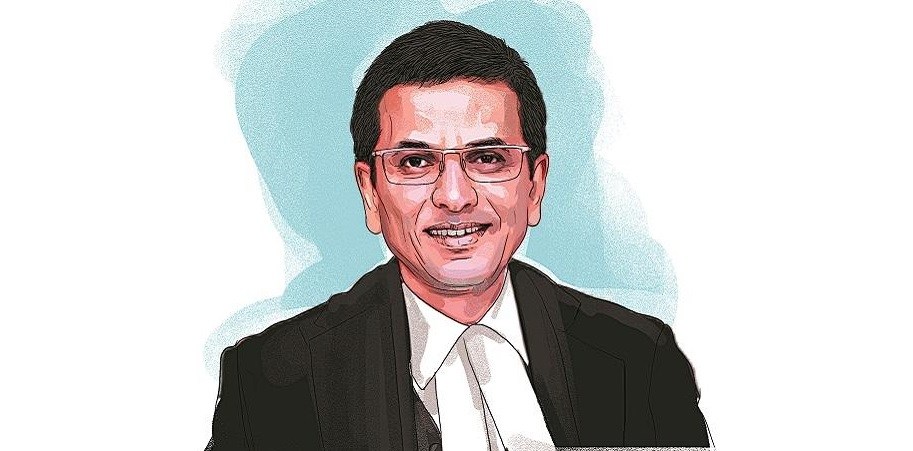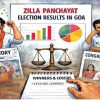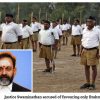Goa is abuzz with excitement as vintage bike and car owners, users, collectors and fans are decking […]

SIGNIFICANT CHANGES AHEAD?
Judiciary, Oct 06- Oct 12 2018 October 6, 2018Minority views in constitutional judgments cannot be enforced, but they often carry “brooding wisdom” which becomes the majority view after a generation of judges. This has happened in the Supreme Court several times in the past when dissenting views became majority views.
Therefore, the dissenting judgment of Justice D Y Chandrachud in the Aadhaar judgment on September 27, 2018, could be carrying seeds of wisdom that might be recognised by a later set of Supreme Court judges
BY Apurva Vishwanath
In the last week, as the Supreme Court rushed through a dozen major verdicts in Constitution cases, Justice D Y Chandrachud delivered two powerful dissent notes that are scathing indictments of the government. And he did it with a smile.
Through the two dissenting opinions — in the Aadhaar case and in the arrest of activists for allegedly inciting the Bhima-Koregaon violence — the Harvard-educated Chandrachud placed personal liberty above the government’s power to curb fundamental rights for the larger public interest.
This libertarian approach, relatively uncommon to Indian judges, has already got many eagerly anticipating his future tenure as Chief Justice of India (CJI). Chandrachud, son of India’s longest-serving chief justice, Y V Chandrachud, will hold the highest judicial office from November 9, 2022, to November 10, 2024.
Tenure in SC
When M Hidayatullah was appointed to the Supreme Court in the 1970s, he says he was told by his seniors to follow the tradition that juniors do not speak. Chandrachud has broken the tradition, if there was one.
Justice Chandrachud, or ‘DYC’, as he is referred to in legal circles, was elevated to the Supreme Court in May 2016. Since then, he has been handpicked by three successive CJIs — T S Thakur, J S Khehar and now Dipak Misra — to sit with them in Courtroom 1, barring a few days in between. This ensured that he was part of all the big cases before the apex court.
In a little over two years, he has been on benches that have delivered more than 220 judgments. He has been part of the landmark judgments on privacy, euthanasia, decriminalisation of homosexuality, adultery, entry of women into Sabarimala, the Hadiya case, the medical college cases and the PIL on mandatorily playing the national anthem in cinema halls.
Although he mostly engages with advocates with a smile on his face, Justice Chandrachud came down heavily on senior advocates too for speaking over him in court.
Criticism of judgments
While liberals are applauding his dissent on Aadhaar and Bhima-Koregaon, it must be remembered that Justice Chandrachud still invites criticism for writing the unanimous judgments in two particular cases — the death of judge B H Loya, and the CJI being ‘master of the roster’.
Justice Chandrachud trod with caution on both occasions, resulting in relief for the government in the first case, and relief for CJI Misra, who was under attack for his administrative decisions, in the second.
Another ruling of his that was criticised by both the government and the public at large was the verdict banning liquor vends on highways. When criticism mounted, the top court substantially diluted its verdict, but refused to recall it.
Dissent
It is rare that a junior judge dissents or disagrees with CJIs, but Justice Chandrachud has written at least four major dissenting opinions, and in some cases, persuaded CJI Misra to change his view.
Take for example the National Anthem case and the Hadiya case — two instances where the course of the case changed completely due to Justice Chandrachud’s line of questioning in court. In the final rulings, CJI Misra reversed his interim orders and ruled in favour of individual liberty.
However, it is unlikely that Justice Chandrachud knew that he was dissenting in the Aadhaar and Bhima-Koregaon cases as he wrote his judgment in advance and circulated it to his colleagues. While Justice A.K. Sikri read out the majority verdict in Aadhaar, Justice Chandrachud sat with a smile and called his opinion “somewhat a dissent”, since he disagreed with them “substantially”.
In the Bhima-Koregoan case, Justice Chandrachud gave specific directions to list the case later, unusual in a dissent note. Perhaps he incorrectly presumed that he had prevailed over CJI Misra once again.
Potential CJI
Apart from the expectations of liberals, Justice Chandrachud is also frequently weighed against his father, Y.V. Chandrachud. While it was fairly assumed that Justice Chandrachud would be a judge of the Supreme Court, the only speculation at that time was “how soon” and “if he would break his father’s record tenure of seven years as CJI”.
A product of St Stephen’s College in Delhi and Harvard University, he has written papers on various subjects of law. After obtaining two advanced degrees in law from Harvard University, he went on to become one of India’s youngest lawyers to be designated senior advocate at the age of 39. Immediately, in 1998, he was appointed Additional Solicitor General of India.
While his thesis was on affirmative action, his other pioneering research work as a Harvard graduate was cited by his father’s colleagues in landmark verdicts.
During his time as a lawyer, he also taught International Law at Oklahoma University and was a visiting professor in Comparative Constitutional Law at the University of Bombay from 1988-1997.
He was appointed a judge in 2000, even before he had turned 42. After serving in the Bombay High Court for 13 years, Justice Chandrachud was appointed the chief justice of the Allahabad High Court in 2013, and was elevated to the SC three years later.
As head of the Allahabad HC, Justice Chandrachud had frequent run-ins with the Akhilesh Yadav-led Uttar Pradesh government on the appointments of the Lokayukta and the UP Public Service Commission.
Stepping out of HIS father’s shadow
Justice Chandrachud has publicly admitted to his father’s influence on his career and outlook on law, and also credited Chandrachud senior for teaching him that “law should have a human face”.
However, Justice Chandrachud so far has overruled two of his father’s judgments.
The judge joined the Supreme Court in 2016 and soon raised many eyebrows when he wrote last year that the infamous judgment written by a Constitution bench during the 1975 Emergency was wrong.
The judgment had ruled that during an Emergency, citizens had no fundamental right, including the right to life.
His father was one of its authors, but filial affection for his late father, Chief Justice Y V Chandrachud, did not seem to have stood in the way when he overruled his father. There was one dissenter then, Justice H R Khanna, and his “brooding wisdom” has now been upheld by Chandrachud Junior.
Then, last week, he overruled another landmark judgment by his father, which had upheld the colonial-era adultery law.
He was on the bench that recently decriminalised same-sex relationships.
FAMILY AND FUTURE
His son, a lawyer in the Bombay High Court, has also taken after him and recently written a widely reviewed book on the process of appointment of judges. Since his grandfather had the longest term as the Chief Justice of India, and that too when Indira Gandhi wanted “committed judges”, he probably gathered a lot of anecdotes from the family dining table.
Since DYC is one of the youngest on the bench and slated to become the Chief Justice of India on the seniority principle, his views have special significance for the future. Just 59 now, he will retire only in 2024.
Political tumult is on the horizon, and the independent spirit of Justice Chandrachud should be a concern for any government that tries to manipulate or bypass the Constitution.
Courtesy: Print.in














